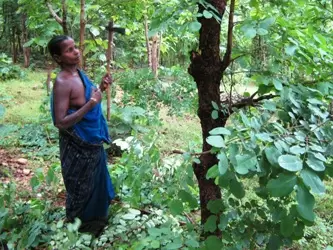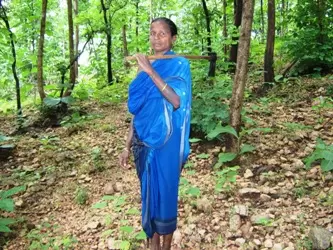In Hara Dei’s hands, Kapsi Dongar is safe from poachers and timber mafia

14-June-2013
Vol 4 | Issue 24
Sinapalli may be a small block in the Nuapada district of Odisha, but its thick forest cover attracts many a nature lover to this otherwise nondescript part of the eastern state. Located between the borders of Kapsi and Sardapur villages is a densely wooded hillock that the locals call Kapsi Dongar.
Venture towards this verdant wilderness and from among the trees could emerge a fierce, middle-aged woman armed with an axe on her shoulder. This is Hara Dei Majhi, 55, the protector of this ‘dongar’ (hillock).
 |
|
This is Hara Dei Majhi, 55, the protector of the lush Kapsi Dongar forest in Nuapada district of Odisha. (Photos: Sarada LahangirWFS)
|
The illiterate tribal woman has been keeping a sharp vigil over these 11.25 acres of forest land for over three decades now. After all this, according to her, is the “legacy of my late husband”.
It was Majhi’s husband, Anang, who had initiated the process of planting trees on what was once a barren patch of land at the foothills of Kapsi Dongar. A dedicated conservationist, he understood the vital role forests played in maintaining a balance in the local eco-system and so he nurtured the trees like his own children.
Recalls Majhi, “In the beginning, I was not involved in his work. As we were poor, we depended on minor forest produce and tendu leaves to keep our home fires burning. However, due to gradual deforestation our livelihood was affected and we had to become daily wage labourers to feed ourselves.
“But Anang would hardly ever have the time to go for wage work because he felt that the task of protecting the forest from timber smugglers was more important.”
Majhi may have once even resented her husband’s attitude because this preoccupation with the forest meant that he could not provide adequately for their family of five.
Looking back, however, she says, “He made me understand the need for forest conservation. He told me that it was the green cover that ensured good rainfall; that provided tribals like us with food. Gradually, I started taking an interest in his work and even helped him out in guarding the trees.”
Anang spent his entire life taking care of the forest and it was amidst its green cover that he passed away in 1995. Even today Majhi cannot forget that fateful, stormy night.
“My husband lost his life while protecting the forest. It was raining heavily and he got ready with his baton, spades and proceeded towards the forest, which is about three kilometres from the village. Later, when he did not turn up, I went out to search for him with the help of some neighbours,” she narrates.
Majhi found Anang with severe injuries – he had hurt his head and was bleeding profusely. Although he was in pain he told her that he had caught some timber thieves cutting trees. When he tried to chase them away they attacked him and then fled.
As there was no government medical facility in their village, there was no option but to wait till morning to get medical attention.
“Our village ‘vaidya’ (local medicine man) gave some medicine but it did not work. My husband refused to go back home. He told me that he wanted to breathe his last in the forest. He also urged me to take care of the forest,” she continues, her eyes moist.
Majhi took on her husband’s unfinished business as a challenge. But protecting the forest as well as looking after three small children was easier said than done. “I had no proper source of earning a living. I could not go to distant places for wage work because leaving behind my kids and the forest was not an option. So I took to doing part time work as domestic help,” she elaborates.
Here’s what her daily schedule was like in those days. Early in the morning she would patrol the forest for an hour. Once back home, she would complete her household chores, feed the children and then head out to work in other people’s homes.
Back at four she once again went to the forest. “Sometimes I would stay late into the night in the ‘dongar’,” she recalls.
Heading out to the woods twice a day meant that many a time she had to request neighbours to keep an eye on her children. But she was convinced that the forest needed her as well, “The state's forests are on the verge of extinction because of timber smuggling, extensive mining, and unplanned industrialisation.
“The forest is the lifeline of us tribal people. More than 60 per cent of tribals do not own any land. So they either survive on minor forest produce or clear out a small area in the forest and cultivate pulses, ragi and millet. So, for us, it is important to save this habitat.”
According to local activist Bijay Kumar Sahish, there are two major threats to the forests, “Firstly, forest fires are very common, particularly during the hot and dry months of March and April.
 |
|
Hara Dei Majhi patrols the forest at least twice every day armed with an axe
|
“While some are accidental, quite a few are started deliberately. It destroys the wildlife and the flora and fauna. Also, there is the other menace of timber thieves. Har Dei has been fiercely guarding the Kapsi Dongar forest from these dangers.” Incidentally, the Kapsi Dongar forest has more varieties of trees than adjoining forest tracts, and they include teak, sal, tendu and mahua, among others.
In a bid to involve the local community in her effort, in 2001 Majhi formed a committee, the Kapsi Dongar Vana Surakshya Samittee, with support from the district forest department.
Over the years, as the leader of this group she has been successful in ensuring that the forest remains encroachment free and, in fact, flourishes. For her exceptional commitment, Majhi was conferred the title of ‘Prakruti Bandhu’ (Nature’s Friend) by the state government for the year 2010-11. In addition, she has been felicitated by the district administration.
Sarat Chandra Panda, District Forest Officer, Khariar Forest Division, is all praise for her, “I have seen many groups protecting the forest in Odisha during my career but Hara Dei is unique. Her dedication and love for nature has inspired many villages in the region to form Van Surakshya Samitees (VSSs) to save the forest. Even the incidence of forest fires in our block has decreased by 50 per cent in the last five years.”
Of course, these accolades have not meant that her struggles have ended. Although she does receive a little monetary help from the government off and on – the forest department gave her Rs 2,000 as incentive in 2010-11, Rs 2,500 in 2011-12 and Rs 1,000 this year – she has to work hard on her own to survive.
Both her daughters are married and her son has grown up as well. Majhi has built a small mud house at the edge of the forest and has asked for a tube well to be dug near her new home. Panda has accepted her request.
At a time when forests are fast disappearing everywhere, Majhi’s unique crusade to treat every tree in her forest as a dearly loved child will continue to inspire – and hopefully encourage others to follow in her wake. - Women's Feature Service














